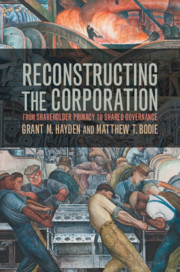Book contents
- Reconstructing the Corporation
- Reconstructing the Corporation
- Copyright page
- Dedication
- Contents
- Preface
- Acknowledgments
- 1 Introduction
- 2 Preference Aggregation in Political Institutions
- 3 Preference Aggregation in Corporations
- 4 The Corporation as Contract
- 5 Shareholder Homogeneity
- 6 The Argument from the Residual
- 7 The Argument from Arrow’s Theorem
- 8 The Shareholder Franchise and Board Primacy
- 9 A Firm-Based Approach to Corporate Voting Rights
- 10 Democratic Participation and Shared Governance
- 11 The German Codetermination Experience
- 12 Conclusion
- Notes
- Index
10 - Democratic Participation and Shared Governance
Published online by Cambridge University Press: 18 February 2021
- Reconstructing the Corporation
- Reconstructing the Corporation
- Copyright page
- Dedication
- Contents
- Preface
- Acknowledgments
- 1 Introduction
- 2 Preference Aggregation in Political Institutions
- 3 Preference Aggregation in Corporations
- 4 The Corporation as Contract
- 5 Shareholder Homogeneity
- 6 The Argument from the Residual
- 7 The Argument from Arrow’s Theorem
- 8 The Shareholder Franchise and Board Primacy
- 9 A Firm-Based Approach to Corporate Voting Rights
- 10 Democratic Participation and Shared Governance
- 11 The German Codetermination Experience
- 12 Conclusion
- Notes
- Index
Summary
This chapter sets out the second of two positive arguments for extending corporate voting rights to employees. Democratic participation theory provides a unique argument for extending governance rights to both shareholders and employees. The theory is derived from the uncontroversial propositions that governance rights should be tied to interest and that we must be able to assess that interest in a way that is both accurate and manageable. These notions largely spring out of political theory, but are also consistent with economic and social choice theory and their focus on preference fulfillment and the construction of incentive structures designed to promote good decision-making. And, like the theory of the firm, democratic participation theory generally counsels in favor of adding employees to the corporate electorate, but also tells us when we might be in one of those rare situations where governance rights should be extended to other stakeholders. That is, both aspects of the shared governance model of the corporation – the theory of the firm and the theory of democratic participation – have a flexibility that the arguments for the exclusive shareholder franchise seem to lack.
Keywords
Information
- Type
- Chapter
- Information
- Reconstructing the CorporationFrom Shareholder Primacy to Shared Governance, pp. 161 - 171Publisher: Cambridge University PressPrint publication year: 2021
